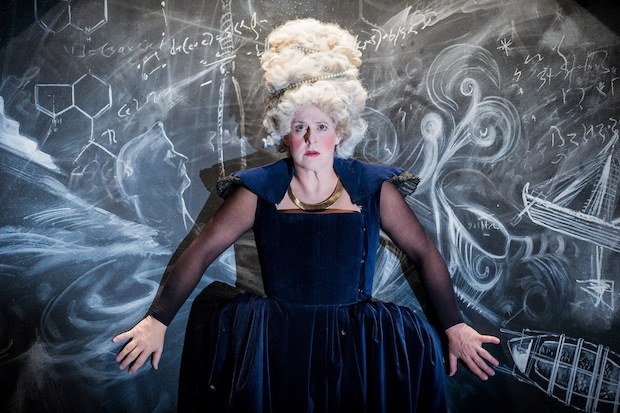Visits by English Touring Opera are always to be looked forward to, but this autumn it has surpassed itself with three baroque works, two of them masterpieces and the third a fascinating rarity, all performed by casts of astonishingly high calibre, and produced helpfully, resourcefully, with simple elegant sets, which are all that is needed, though they probably cost a thousandth as much as the eye-catching splurges that we often see in London.
First up, anyway at the Arts Theatre Cambridge, was the rarity: Cavalli’s Jason (intelligent to translate the titles where possible, since all the operas are sung in English). Apparently, it was the 17th century’s most popular opera, though that must be hard to determine. In its full form it lasts four hours, so mercifully ETO cut it to half its length. Its central female figure being Medea, one expects a bloodbath; but actually what we saw was more comic than heroic-tragic, with a surprising number of characters emerging to sue vainly for Medea’s hand in marriage.
Given Hannah Pedley’s sensationally alluring Medea, it may be a surprise that there weren’t even more. A thrilling actress, with an arresting and recognisable voice, I am, as so often with members of the ETO casts, bemused that I haven’t seen her at any of the major opera houses, especially when you consider where they go to recruit many of their artists, and who they end up with. Fortunately her Jason was up to her standard: Clint van der Linde. Jason behaves despicably, but one wouldn’t have wanted anyone else to end as happily, and it’s a tribute to van der Linde’s acting that he brought that off. The tiny orchestra for this opera provided ravishing accompaniments, and though I still regard Cavalli as the Salieri to Monteverdi’s Mozart, I’d happily see this production again.
The next evening was Monteverdi’s The Coronation of Poppea, the absolute summit of baroque opera. This too was cut, of necessity, but not heavily. For an inadequately explained reason, it is set in Stalin’s Russia, but all that comes to is a few threatening Soviet uniforms, and endless eavesdropping, though rarely to any purpose. That apart, the performance was almost all one could wish. With an only slightly enlarged orchestra from Jason, the versatile conductor Michael Rosewell drew ravishing sounds from it, and judiciously varied the tempi — so often something overlooked in performances of these operas. The forces weren’t up to the requirements of the scene that gives the opera its name, so it was omitted, and the gorgeous final duet came upon us unawares, magically lingered over by Helen Sherman’s Nero and Paula Sides’s Poppea. These two generated as much erotic heat as was possible with Sides being in an advanced stage of pregnancy. Hannah Pedley reappeared as Ottavia, immensely dignified and scheming. Ottone was Michal Czerniawski, one of a fine stock of countertenors, and, like Ottavia, in a position to earn our sympathy, but somehow — so Monteverdi and the librettist Busenello contrive — interesting us less than the shocking couple who end so blissfully (and forget about the historical realities).
This opera should still shock, and in this production it does: not only are vicious people sometimes happy, we can’t help, also sometimes, being pleased that they are. Meanwhile that sententious pillar of morality Seneca was mainly effectively sung by Piotr Lempa, and the feather-brained Drusilla given the right airy treatment by Hannah Sandison. I marvelled afresh at the melodic fecundity, the rhythmic energy of this work, always in the service of its riveting drama.
Last came another look at the hideous and inevitable disgustingness of the powerful: Handel’s Agrippina, an early work to a brilliant libretto by Cardinal Grimaldi. Spellbinding as this opera is, and by Handelian standards quite compressed, it is at least as much thanks to the libretto as to the music that it is so compelling. There are very few long arias, so the plot is always moving: and it contrives to be both complicated (of course) and symmetrical and hilarious.
Poppea and Nero reappear, but Sides had a heavy cold and her role was taken over by Natasha Day, who made a sensational impact. A commanding actress, she uses her lovely and (so far) small voice with utter assurance, and held her own with Clint van der Linde, here reappearing as Ottone, with the score’s most moving music, and with the formidable Gillian Webster as Agrippina — a great stage presence, but musically a little less imposing. Nerone was hatefully characterised by Jake Arditti, camp and petulant. Of the greasy courtiers Russell Harcourt stood out as Narciso, quite as dreadful as Basilio in either of his incarnations. It’s almost alarming to think that at 25 Handel was so exuberantly cynical about politicians, who have never been more scathingly satirised; and depressing to think that, as always, satire has next to no effect.
Depressing, too, that in Cambridge, an opera-starved city, so far as I could tell there was not a single undergraduate to be seen in the audience, which was even more elderly than one is used to in other locations; and that there were empty seats. If only people knew what they are missing.






Comments